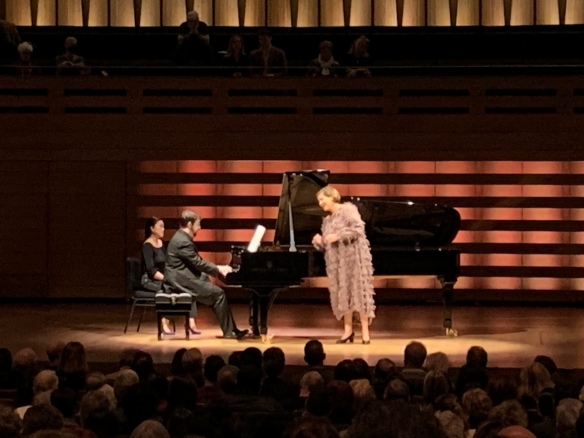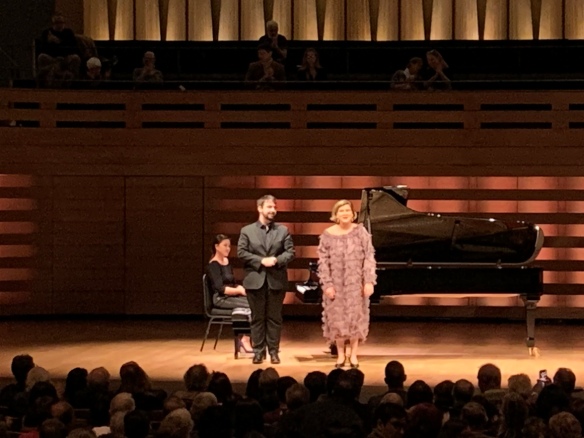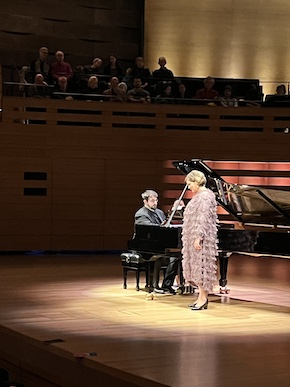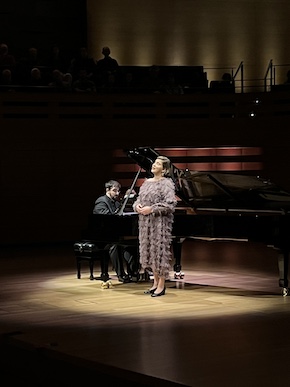Mezzo-soprano Ema Nikolovska made her Koerner Hall recital debut on Sunday afternoon just twenty-six years after first enrolling at the Royal Conservatory of Music. It was clearly an emotional occasion for her and justified the barely choked back tears in her introduction. The emotion though did not negatively affect her singing which was notable for, among other things, great control; emotionally and technically.

She was partnered at the piano by Charles Richard-Hamelin. It’s always interesting to have a concert pianist at a song recital (rather than a specialist collaborative pianist). There’s a greater risk that two different visions of the music will conflict but when it works it can elevate everything a notch and that’s what happened on Sunday. It felt like a really good partnership.

It was an interestingly constructed programme too with conventional (if not necessarily familiar) Liederabend material coupled with some, frankly, rather off the wall pieces. And it worked. The first half comprised of four less familiar Schubert Lieder plus Margaret Bonds’ Songs of the Seasons with a solo piano opportunity; Tchaikovsky’s “June”, between the two sets.

It was really good. Nikolovska really has fantastic command of a very good instrument. Whether she’s singing high or low; loud or soft, there’s no sign of strain and she seems able to apply colour just as she wishes. Richard-Hamelin is really good too and they have a great partnership going.
 The second half was also interesting. It kicked off with Debussy’s well known Ariettes Oubliées preceded on piano by “Lent” from his Images oubliées. Indicative of the care that went into this recital was the the use of lighting to bring in the singer at the beginning of the songs. There was also opportunity here for Nikolovska to show that she can float a really lovely pianissimo.
The second half was also interesting. It kicked off with Debussy’s well known Ariettes Oubliées preceded on piano by “Lent” from his Images oubliées. Indicative of the care that went into this recital was the the use of lighting to bring in the singer at the beginning of the songs. There was also opportunity here for Nikolovska to show that she can float a really lovely pianissimo.
The last set (almost) ran two rather beautiful songs by Nikolai Medtner; “Twilight” and “Sleeplessness”; that deal with the natural world, the passage of the seasons, mortality and renewal, with Nicolas Slonimsky’s Five Advertising Songs which set the texts of newspaper advertisements of the 1930s for laxatives, toothpaste and the like. It was completely incongruous in a good way. The sheer beauty of the Medtner really set up a very funny performance of the Slonimsky. The lady can do funny!
 There were two encores. The first was an arrangement of a Macedonian/Serbian song “Go Down, Bright Sun” to a text by Aleksandar Sarievski. The arrangement, by Darija Andovska, was made especially for these two performers and skilfully combines modern classical composition including extended piano technique with the intrinsic folk elements of the song to make something rather beautiful. Appropriately enough the final number was Debussy’s “Beau Soir”.
There were two encores. The first was an arrangement of a Macedonian/Serbian song “Go Down, Bright Sun” to a text by Aleksandar Sarievski. The arrangement, by Darija Andovska, was made especially for these two performers and skilfully combines modern classical composition including extended piano technique with the intrinsic folk elements of the song to make something rather beautiful. Appropriately enough the final number was Debussy’s “Beau Soir”.
It was a really great way to spend a winter Sunday afternoon. Beautiful, intelligent singing in five languages coupled with exquisite pianism. What’s not to like?
Photo credits: Barbora Krsek
